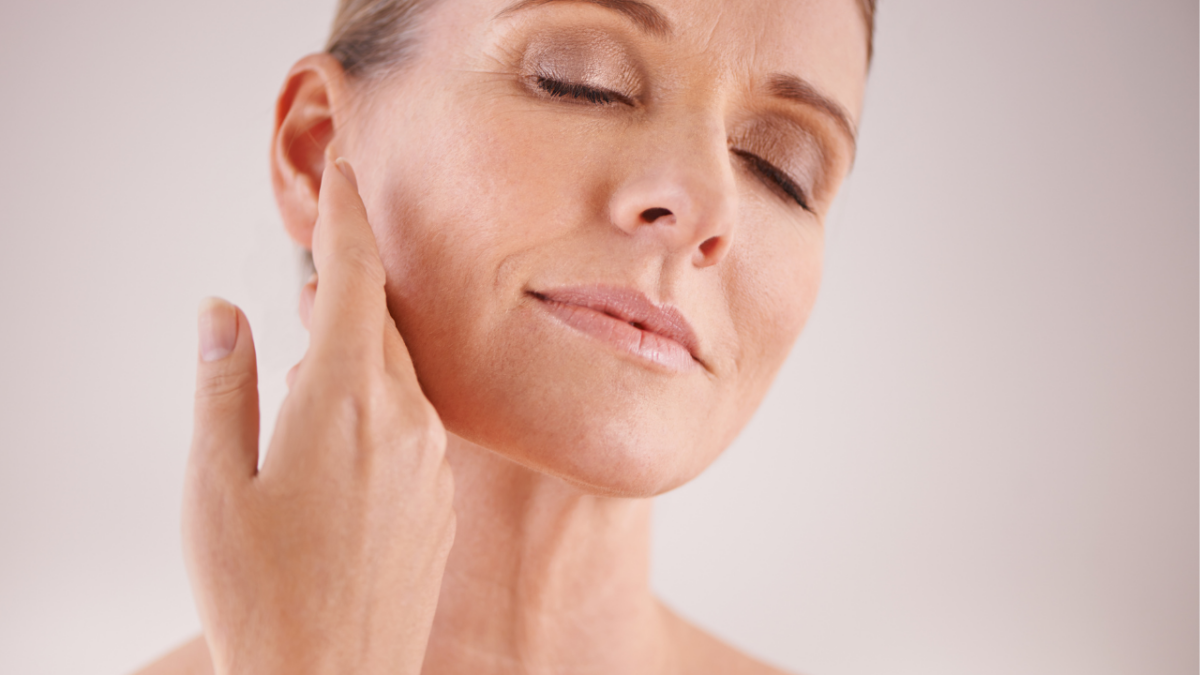How to Combat Skin Aging and Keep Your Radiance According to a Facial Plastic Surgeon

When it comes to menopause, we’re all familiar with some of the more notorious symptoms—hot flashes, mood swings, and those pesky night sweats. But there’s another major shift happening during this time that many women don’t expect: the rapid changes in our skin. In a recent video, Dr. Amir Karam, a board-certified facial plastic surgeon, explains how menopause accelerates skin aging and what you can do about it.
The Menopause-Skin Connection: Why Does It Happen?
It all comes down to hormones, particularly estrogen, the magical elixir that keeps our skin looking plump and youthful. As women approach perimenopause and menopause, estrogen levels take a steep dive. Unfortunately, with that decline comes a host of skin issues—think dryness, thinning, wrinkles, and even sagging.
Here’s why it happens:
- Loss of collagen: Estrogen is vital for collagen production, the protein responsible for keeping our skin firm and smooth. Less estrogen means less collagen, and over time, this leads to thinner, more fragile skin.
- Decrease in skin elasticity: The fascia, which is a deeper layer beneath the skin, also starts to lose its ability to “bounce back.” This decline causes the dreaded sagging in areas like the jawline and neck.
- Increased dryness and pigmentation: A reduction in estrogen can also cause our skin to lose its natural moisture, leading to that tight, dry feeling. Combine this with an increased sensitivity to UV rays, and you might notice more age spots and uneven skin tone.
What Can You Do to Manage Skin Aging During Menopause?
The good news? While menopause is inevitable, premature aging of the skin doesn’t have to be.
Dr. Karam outlines several ways to protect and rejuvenate your skin during these hormonal shifts, ranging from effective skincare routines to professional treatments. Here’s what you can do to keep your skin looking its best.
1. Start with Skincare
Consistency is key here. Dr. Karam recommends incorporating active ingredients into your routine that help boost collagen and keep your skin barrier strong. Here’s what to look for:
- Retinol: This powerful ingredient speeds up cell turnover, meaning it helps shed dead skin cells and encourages the production of new ones. It’s a gold standard in anti-aging and helps smooth fine lines and wrinkles over time.
- Vitamin C: An antioxidant powerhouse, vitamin C not only brightens the skin but also stimulates collagen production. Use it daily to combat pigmentation and boost your glow.
- Peptides: These small proteins send signals to your skin cells, encouraging them to repair and rejuvenate. Peptides help build collagen and keep the skin firm and bouncy.
- Niacinamide: Also known as vitamin B3, niacinamide is great for strengthening the skin barrier, reducing redness, and evening out skin tone. It’s a multitasker that complements other active ingredients in your skincare routine.
2. In-Office Treatments
While skincare products are great for maintaining healthy skin, you might need a little extra help. Dr. Karam suggests professional treatments to give your skin that extra boost:
- Lasers: Laser treatments work by heating up the skin, triggering the body’s natural healing process and collagen production. They can help improve skin texture, reduce fine lines, and even out pigmentation.
- Microneedling: This treatment involves creating tiny punctures in the skin to stimulate the production of collagen. It’s ideal for improving skin texture and reducing wrinkles.
- Chemical peels: A chemical peel uses acids to exfoliate the top layer of your skin, revealing smoother, fresher skin underneath. It can also help with pigmentation issues and stimulate collagen.
While these treatments can deliver noticeable results, Dr. Karam emphasizes that they are enhancers, not permanent fixes. Think of them as periodic refreshers to boost your skincare routine.
3. Hormone Replacement Therapy (HRT)
Hormone replacement therapy is sometimes used to alleviate menopausal symptoms, and it can also help temporarily slow skin aging. By replenishing estrogen levels, HRT can boost collagen production and improve skin hydration. However, Dr. Karam stresses that HRT isn’t a long-term solution for everyone due to potential health risks. Always consult with your healthcare provider to weigh the pros and cons.
The Importance of Early Prevention
Dr. Karam recommends starting your anti-aging skincare regimen in your 30s or 40s, well before menopause sets in. This proactive approach can help maintain skin quality and slow down visible aging as hormone levels begin to drop. Investing in good skincare early on will not only keep your skin healthy but also make it easier to manage the changes that come with menopause.
Can You Prevent Sagging Altogether?
Sadly, no. While topical treatments and in-office procedures can improve the texture and quality of your skin, significant sagging in areas like the jawline and neck may require surgical intervention. Facelifts or neck lifts are options for women who want to fully address sagging skin.
But don’t despair! While you may not be able to entirely stop skin from sagging without surgery, you can still significantly improve your skin’s overall health and appearance. By sticking to a consistent routine and incorporating both preventative and restorative treatments, you have the power to manage how your skin ages.
Take Control of Your Skin’s Future
Menopause may bring a whirlwind of changes, but when it comes to your skin, there’s plenty you can do to slow the aging process. Whether it’s using powerful skincare ingredients like retinol and peptides or scheduling periodic treatments to boost collagen, you have options. And don’t forget—starting early is your best weapon! The message is clear: you have control over how your skin ages, even during menopause.
